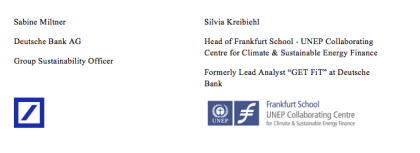Deutsche Bank Group
A foreword by the concept initiators
In conjunction with its core business, Deutsche Bank already holds a leading position in renewable energy financing. Through its strategic initiatives addressing the global challenges of climate change and alleviating poverty Deutsche Bank is also an internationally recognized sparring partner of the public sector. Along with the Desertec industry initiative, the GET FiT project is an outstanding example of how to harmonize the broad range of activities that are required to tackle ecological, social and economic challenges.
We developed GET FiT - Global Energy Transfer Feed-in Tariffs – in January 2010, following a request from the Advisory Group on Energy and Climate Change (AGECC) of the Secretary General of the United Nations to present new concepts for promoting renewable energy investments in developing regions.
The objective of GET FiT is to combat climate change and increase access to clean energy by supporting investment in capital intensive renewable energy sources in emerging and developing countries.
In light of budget constraints as well as a lack of investor confidence in the governments of developing countries, GET FiT accepts that international support will be required to scale up renewable energy generation capacities. The concept combines mechanisms and structures of the public as well as the private sector and creates an innovative public-public-private partnership:
- The developing country government and/or electricity regulator (the public sector of the developing world) supports renewable energy projects by implementing appropriate regulatory schemes for renewable energy generation. Fixed payments for generated electricity as well as priority treatment of renewable energy are crucial for facilitating private sector investments.
- The public sector of the developed world supports an “upgrade” of the existing regulatory environment in the developing world. It creates transparency, longevity and certainty for private sector investors and consequently mitigates actual and perceived risks, which the action of the developing country government alone could not accomplish. In order to achieve this they should absorb the credit risk in relation to the single offtaker of electricity (counterparty risk guarantee). Bilateral and multilateral development partners might also offer financial support for feed-in tariff payments (burden sharing with the developing country).
- Building on the improved risk profile and economic viability of renewable energy investments, the private sector is expected to deploy capital. It absorbs all manageable risks, in particular technological and operational risk.
These public sector financing mechanisms address key issues that generally inhibit private investment in renewable energy in developing countries - in particular the lack of creditworthy off-taker structures, significant (perceived) political risk as well as a lack of financial viability of investments due to low feed-in tariffs. GET FiT targets a fair risk allocation between the public and the private sector and allocates risks to the party which is best positioned to manage it. This makes GET FiT also a cost efficient support mechanism.
The GET FiT fund concept is unique and innovative in its philosophy and approach. By offering a comprehensive support package, it goes well beyond the conventional wisdom of how to promote private investment in renewable energy.
The creation of a stable regulatory environment in developing countries („enabling environment“) rather than project-based support for individual developers increases transparency and visibility for the private sector and reduces opportunity costs in new markets.
We at Deutsche Bank are proud that GET FiT has developed from a concept to implementation. Since introducing it in 2010, we have worked intensively with national governments and bilateral and multilateral development institutions to promote this innovative approach. From the very beginning the governments of the UK, Germany and Norway, as well as the Worldbank have spent significant time with us to understand the approach. We are pleased that they have decided to financially support the first GET FiT pilot in Uganda. Also, the Ugandan Energy Regulatory Agency as well as Ugandan government representatives have shown very early interest and demonstrated true ownership. The preparation of the GET FiT feasibility study, however, would have not been possible without the close cooperation with KfW. Their strong interest and open-minded approach as well as leadership in the implementation have been key for turning concept into practice..
GET FiT shows the constructive power of an unbiased and constructive dialogue between thought leaders in the private and the public sector on the one hand, and between developed and developing countries on the other hand. We believe that GET FiT demonstrates that if stakeholders align and join forces, the transformation toward a cleaner, sustainable economy is possible.
We wish the GET FiT pilot a successful launch and encourage all stakeholders to contribute to the successful realization of 125MW of clean and reliable energy in Uganda!




